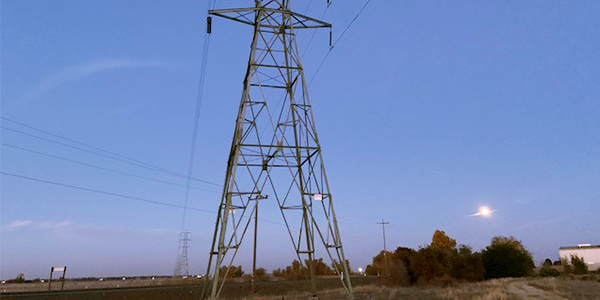Texas and its unprecedented winter weather and power outages loomed large over a U.S. House Energy Subcommittee hearing Thursday, with Democrats and Republicans disagreeing on how to ensure the country’s grid is clean, reliable and prepared for the next catastrophic weather event.
Grid reliability should not be a partisan issue, said Rep. Michael Burgess (R) in his opening remarks at the Feb. 18 hearing on pathways to a clean energy future.
“When the temperature drops below zero, no one cares which party the electricity comes from. They just want the heat to come on, the lights to go on when they flip the switch,” Burgess said.
“We can’t allow the Texas crisis to be used as an excuse to discourage movement toward renewables,” said Rep. Frank Pallone (D), who chairs the House Committee on Energy and Commerce. “What failed here was an energy sector that didn’t consider our changing climate. It was a failure to fully recognize that the 100-year storm of yesterday may now be the 10-year storm of today.”
Pallone said he and other Democrats in the House would soon re-introduce an updated version of the Clean Futures Act — originally proposed last year — that would include a national clean energy standard and other policies to reduce emissions in the building, transportation and industrial sectors. Both Pallone and subcommittee Chair Bobby L. Rush (D) promised future hearings on the power outages in Texas.
Burgess and other Republicans on the subcommittee countered that legislation like the Clean Futures Act and President Joe Biden’s plan to decarbonize the U.S. grid by 2035 represent “top-down, one-size-fits-all mandates” that would cost American jobs and hurt families and communities. In their view, ongoing fossil fuel generation will be critical for grid reliability.
“We cannot afford to rapidly transition our energy system without assurance of its reliability,” Burgess said. “We cannot support policies that destroy entire industries.”
The rhetoric aside, the subcommittee heard a range of policy recommendations from experts representing diverse approaches to the clean energy transition. For example, Paula Glover, president of the Alliance to Save Energy, said her organization is working on legislation to improve energy efficiency for small businesses, with an emphasis on minority-owned businesses and those in disadvantaged communities.
“This plan for Main Street efficiency will target federal grants to match existing utility programs to provide low- or no-cost efficiency upgrades to small businesses,” Glover said. “Since 80% of energy efficiency contractors are small businesses themselves, this is small business helping small business.”
Another proposal would retrofit mission-critical public buildings around the country, leveraging federal funding to draw private capital “and importantly ensure that at least 40% of the projects are in low-income or disadvantaged communities,” she said.
Inclusive, Realistic, Pragmatic
Craig Gordon, senior vice president for government affairs at Invenergy, put transmission at the top of his list.
“There’s simply no way to achieve the ambitions of this administration and the American people without more of it,” Gordon said. “Massive investment in transmission infrastructure connecting diverse regions of the country and different technologies with complementary generation profiles is key to solving this challenge.”
To support such investments, he also recommended a transmission investment tax credit that could be monetized at 100% of its value.
Rich Powell, executive director of ClearPath, a conservative clean energy advocacy group, called for federal policies that are “politically inclusive, realistic and pragmatic. Too often, solutions are oversimplified to a set of false choices,” he said.
Beyond renewables and battery energy storage, getting to net zero will require technologies that are not yet commercially available, including long-duration storage, carbon and direct-air capture and advanced nuclear, Powell said. While year-end legislation provided funding for 20 new demonstration projects, the challenge ahead is getting them built, which means faster, more streamlined permitting to bring down costs, he said.
He also called for a technology-neutral energy innovation tax credit to encourage more investment in emerging clean energy technologies. “Energy-intensive, trade-exposed industries like steelmaking absolutely require affordable new technologies to help them decarbonize,” Powell said. “Without them, we risk not only losing central U.S. jobs, but [ceding] the industrial activity to countries with worse emissions.”
Social Disruption Already Occurring
A focus on technology often minimizes the social and economic impacts of the U.S. energy transition, especially for communities that are dependent on fossil fuel jobs. A recent study from the National Academies of Sciences, Engineering and Medicine calls for “a national transition task force to identify workers in communities at risk, and regional centers where state and local leaders can learn about what’s coming and how to manage it,” said Princeton University Professor Stephen Pacala, who led the study. (See Report: ‘Social Contract’ Needed for Decarbonization.)
“Some might be tempted to view policies targeting the deployment of net-zero technology as the highest priorities,” Pacala said. “This view has it backwards because the technological transition and the social disruption that goes with it are already occurring.”
The study acknowledged that the jobs created by clean energy will not completely replace fossil fuel jobs — which would put natural gas communities in Western Pennsylvania at risk, said Daniel Camp, chairman of the Beaver County Board of Commissioners.
While Camp offered no recommendations, he asked subcommittee members to consider that fossil fuel jobs provide $23 billion in wages for workers across Pennsylvania. For many, the potential loss of those jobs “jeopardizes their ability to put a roof over their families’ heads and continue to put food on their tables.”





